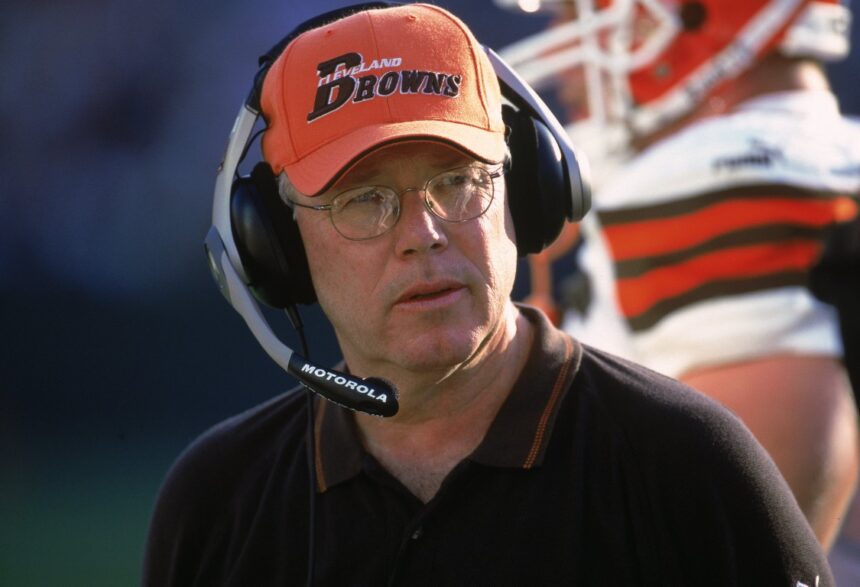Early Life and Background
Chris Palmer was born on September 20, 1949, in Danbury, Connecticut. From a young age, Palmer had a passion for football, which he nurtured through high school and college. He played quarterback at Southern Connecticut State University, where he began developing the knowledge of offensive strategy that would later define his coaching career.
After graduating, Palmer wasted little time transitioning into coaching. Starting at the collegiate level, he spent years building his résumé across programs such as Colgate University, the University of Connecticut, and Boston University. Known for his ability to develop quarterbacks and his deep understanding of offensive play-calling, Palmer steadily rose through the ranks, eventually earning opportunities in the National Football League.
Rise in Sports / Career Highlights
Palmer’s NFL coaching career began in the early 1990s with the Houston Oilers, where he served as the wide receivers coach. He later joined the New England Patriots and Jacksonville Jaguars, working primarily with offensive units. His reputation as a skilled developer of quarterbacks and offensive schemes made him a sought-after assistant.
In 1999, Palmer was chosen as the first head coach of the “new” Cleveland Browns, a franchise that had been reactivated after the original Browns moved to Baltimore in 1996. Tasked with leading an expansion team, Palmer faced one of the toughest challenges in football: building a competitive roster from scratch while managing sky-high expectations from one of the NFL’s most passionate fan bases.
Although his tenure with the Browns (1999–2000) was difficult, with the team struggling to find success on the field, Palmer’s role in laying the foundation for the reborn franchise remains significant. After his time in Cleveland, he returned to assistant roles in the NFL, including stints with the Houston Texans, New York Giants, and Tennessee Titans.
Achievements and Notable Records
While Palmer’s head coaching record with the Browns was not remarkable in terms of wins and losses, his career is filled with noteworthy achievements:
- First head coach of the expansion Cleveland Browns (1999–2000), a milestone in NFL history.
- Served as offensive coordinator for the Jacksonville Jaguars during their early success, helping develop a young Mark Brunell into a Pro Bowl quarterback.
- Worked with the Houston Texans (2002–2005), guiding rookie quarterback David Carr during the team’s first seasons in the league.
- Contributed to the New York Giants’ Super Bowl XLII victory (2007 season) as the quarterbacks coach, working closely with Eli Manning during the team’s historic upset over the undefeated New England Patriots.
- Coached across multiple decades in both the NFL and college football, leaving a lasting influence on countless players and fellow coaches.
Beyond the Game
Outside of football, Palmer is known for his dedication to family and mentoring younger coaches. While he never sought the media spotlight, he embraced his role as a teacher of the game. After retiring from professional coaching, he remained active in football communities and clinics, sharing his knowledge with the next generation.
Palmer also valued stability and loyalty, often maintaining strong relationships with the organizations and players he worked with. This respect earned him a reputation as a coach’s coach — someone trusted to help shape offensive systems and quarterback play.
Challenges and Controversies
Palmer’s biggest challenge was undeniably his time in Cleveland. Leading an expansion franchise is notoriously difficult, and the Browns struggled to compete against established teams. Over two seasons, the Browns managed just five total wins, and Palmer was dismissed after the 2000 season. Critics pointed to personnel struggles and offensive inconsistency, though many acknowledged that the challenges of an expansion team made success nearly impossible in the short term.
He also faced scrutiny in Houston when the Texans’ offensive line allowed David Carr to become one of the most sacked quarterbacks in NFL history. Still, Palmer’s role in developing young talent was widely respected, and he continued to find opportunities across the league.
Legacy and Impact
Chris Palmer’s legacy is defined not just by wins and losses but by his role in significant moments in NFL history. As the inaugural head coach of the expansion Browns, he became part of a pivotal chapter in the league. Later, his work with quarterbacks like Eli Manning and David Carr highlighted his reputation as a teacher and mentor.
Though not a household name compared to legendary head coaches, Palmer earned respect as a football lifer — a man devoted to the game and to helping others succeed within it. His impact is felt through the players he guided, the systems he helped design, and the organizations he contributed to across decades.
Fun Facts & Trivia
- Palmer is one of only a handful of coaches to serve as the first head coach for two different NFL franchises in their expansion eras (Cleveland Browns and Houston Texans).
- During his time with the New York Giants, he worked closely with Eli Manning, who credited Palmer as a steadying influence during the team’s Super Bowl run.
- Known for his calm demeanor, Palmer earned the nickname “Steady Chris” among colleagues for his ability to handle pressure situations.
- He played quarterback at Southern Connecticut State University, giving him firsthand insight into the position he would later coach extensively.
- Palmer’s coaching career spanned over four decades, from college sidelines to NFL stadiums.








